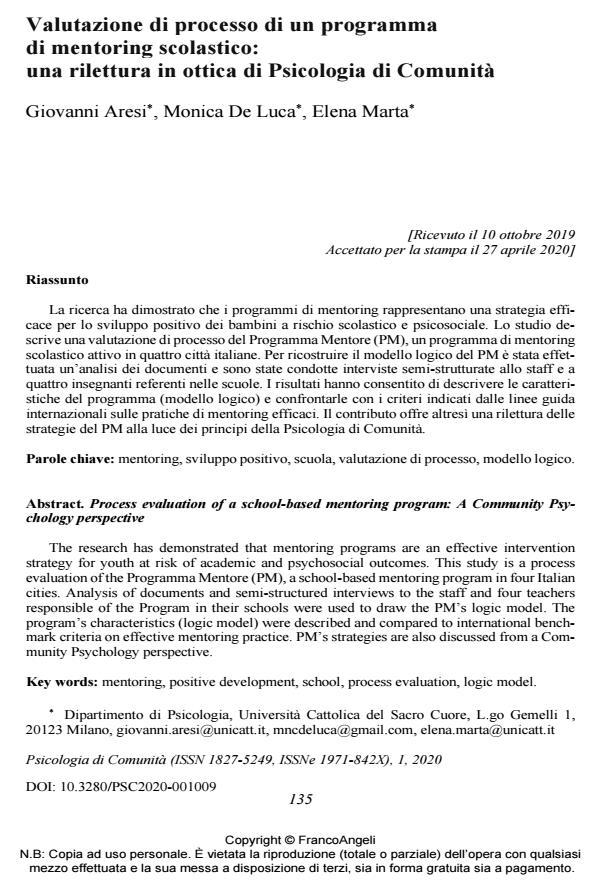Process evaluation of a school-based mentoring program: A Community Psychology per-spective
Journal title PSICOLOGIA DI COMUNITA’
Author/s Giovanni Aresi, Monica De Luca, Elena Marta
Publishing Year 2020 Issue 2020/1
Language Italian Pages 21 P. 135-155 File size 1070 KB
DOI 10.3280/PSC2020-001009
DOI is like a bar code for intellectual property: to have more infomation
click here
Below, you can see the article first page
If you want to buy this article in PDF format, you can do it, following the instructions to buy download credits

FrancoAngeli is member of Publishers International Linking Association, Inc (PILA), a not-for-profit association which run the CrossRef service enabling links to and from online scholarly content.
The research has demonstrated that mentoring programs are an effective intervention strat-egy for youth at risk of academic and psychosocial outcomes. This study is a process evalua-tion of the Programma Mentore (PM), a school-based mentoring program in four Italian cities. Analysis of documents and semi-structured interviews to the staff and four teachers responsi-ble of the Program in their schools were used to draw the PM’s logic model. The program’s characteristics (logic model) were described and compared to international benchmark criteria on effective mentoring practice. PM’s strategies are also discussed from a Community Psy-chology perspective.
Keywords: Mentoring, positive development, school, process evaluation, logic model.
- Scaling Social Innovation: A Cross-Cultural Comparative Study of School-Based Mentoring Interventions Maria Vittoria Bufali, Francesca Calò, Alec Morton, Graham Connelly, in Journal of Social Entrepreneurship /2026 pp.1
DOI: 10.1080/19420676.2023.2213715 - Programme and school predictors of mentoring relationship quality and the role of mentors' satisfaction in volunteer retention Giovanni Aresi, Maura Pozzi, Elena Marta, in Journal of Community & Applied Social Psychology /2021 pp.171
DOI: 10.1002/casp.2495
Giovanni Aresi, Monica De Luca, Elena Marta, Valutazione di processo di un programma di mentoring scolastico: una rilettura in ottica di Psicologia di Comunità in "PSICOLOGIA DI COMUNITA’" 1/2020, pp 135-155, DOI: 10.3280/PSC2020-001009